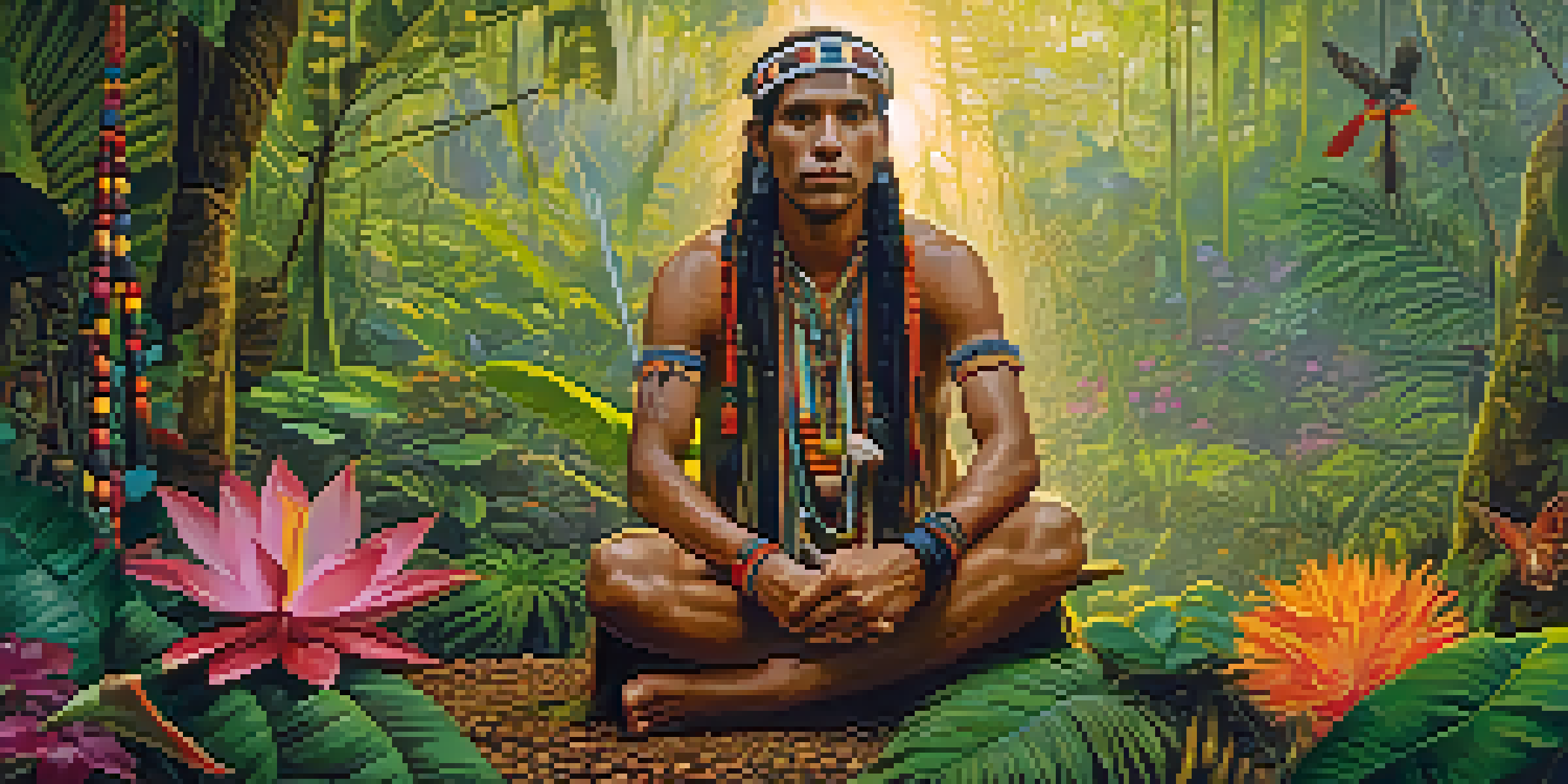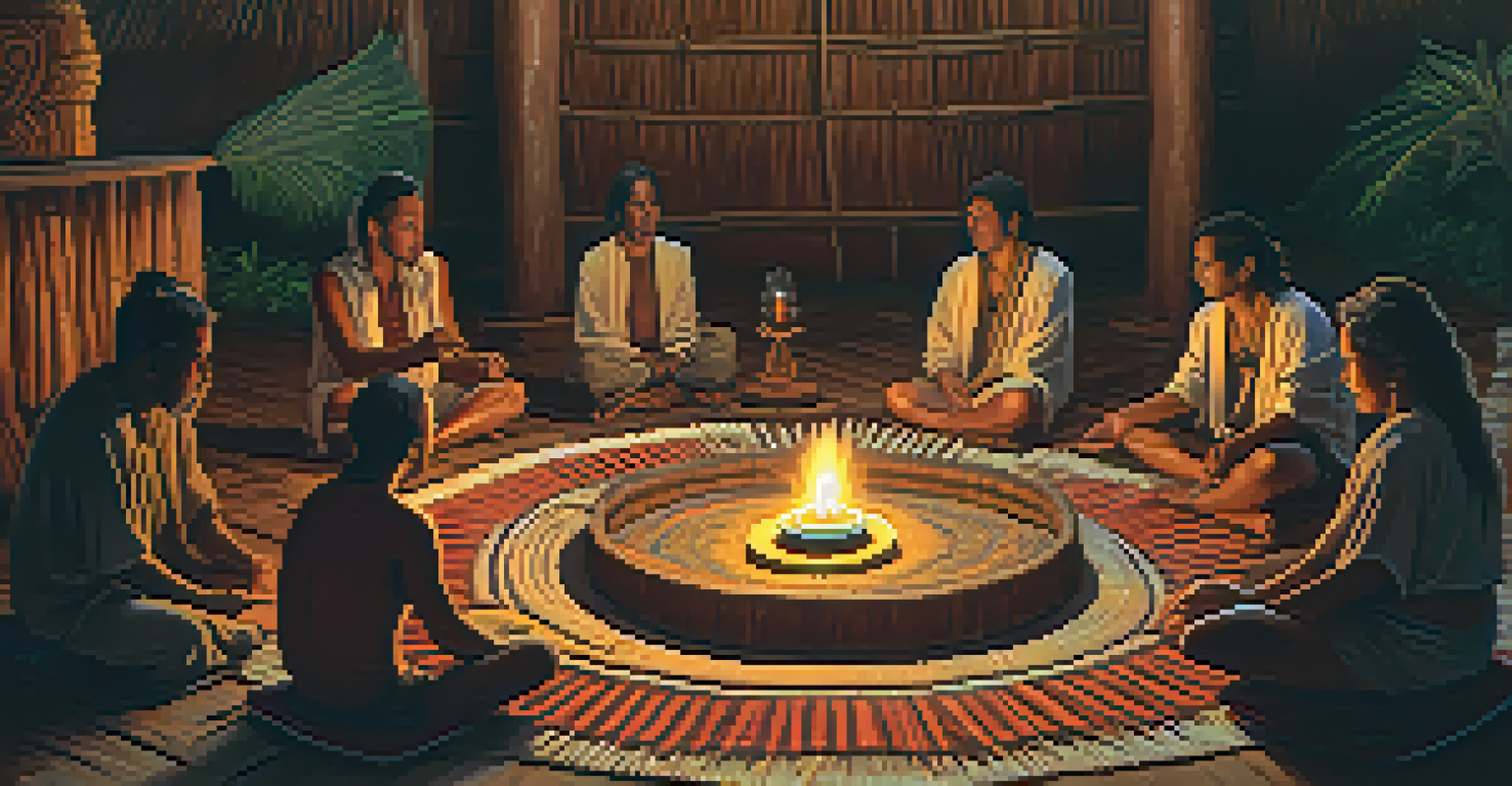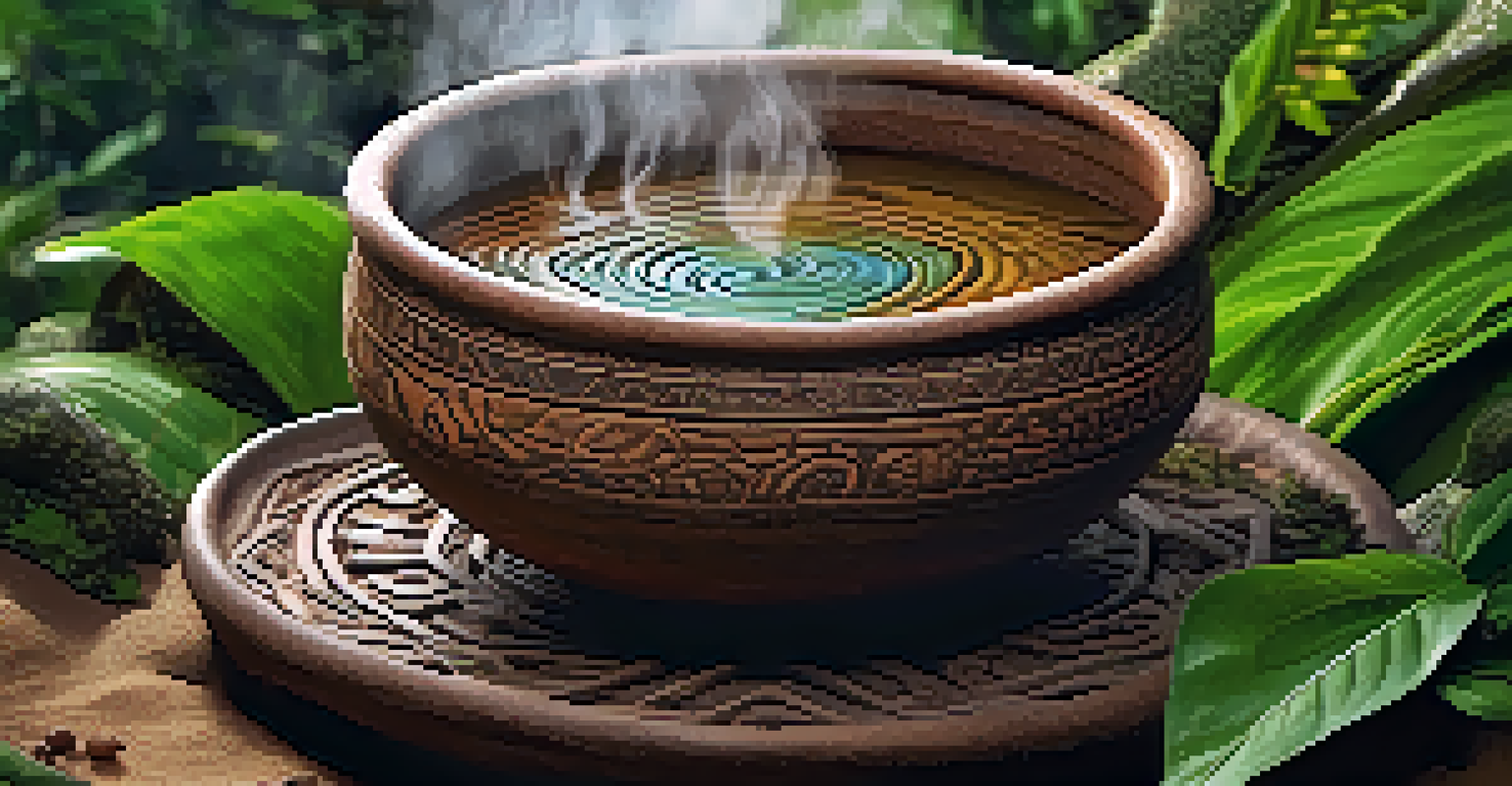Exploring Ayahuasca Rituals in Amazonian Indigenous Cultures

The Origins of Ayahuasca in Indigenous Cultures
Ayahuasca, a powerful brew made from the Banisteriopsis caapi vine and other plants, has deep roots in Amazonian indigenous cultures. Traditionally, it has been used for centuries for its medicinal and spiritual properties, often referred to as a 'teacher' by those who partake in its rituals. Various tribes, such as the Shipibo and Ashaninka, have their unique interpretations and methods of preparation, showcasing the rich diversity of these cultures.
Ayahuasca is a sacred tool for exploring one's consciousness, understanding personal issues, and seeking guidance for communal harmony.
The origins of Ayahuasca rituals can be traced back to ancient shamanic practices, where shamans, or medicine men, would guide participants through the experience. This journey is not merely for recreation; it serves as a vital connection to the spiritual world and the community's ancestors. These rituals often involve singing sacred songs, known as icaros, which help invoke spiritual guidance and healing during the experience.
In these indigenous contexts, Ayahuasca is much more than just a substance; it's a sacred tool for exploring one's consciousness, understanding personal issues, and seeking guidance for communal harmony. The rituals surrounding Ayahuasca encapsulate a worldview where the spiritual and physical realms intersect, reaffirming the importance of nature, community, and tradition.
The Role of the Shaman in Ayahuasca Ceremonies
Central to Ayahuasca rituals is the shaman, who plays a crucial role in guiding participants through their experience. The shaman's knowledge, often gained through years of apprenticeship and personal experience, allows them to navigate the complexities of the Ayahuasca journey. They are responsible for creating a safe and supportive environment, helping participants confront their fears and uncover insights.

During the ceremony, shamans use a variety of techniques to enhance the experience, including chanting icaros and utilizing specific plants for their healing properties. The shaman's presence is integral, as they act as a bridge between the physical and spiritual worlds, ensuring that the participants receive the guidance they seek. This relationship between shaman and participant emphasizes trust and respect, which are essential for a transformative experience.
Ayahuasca's Cultural Roots
Ayahuasca is deeply embedded in Amazonian indigenous cultures, used for spiritual and medicinal purposes through rituals led by shamans.
Moreover, the shaman's role extends beyond the ceremony itself; they often provide aftercare and integration support, helping individuals process their experiences and apply insights to their daily lives. This holistic approach reflects a deep understanding of the mind-body connection and the importance of community support in healing.
The Ayahuasca Experience: What to Expect
For many, the Ayahuasca experience is profound and life-changing. Participants often report vivid visions, emotional releases, and deep introspection during the ceremony. Each individual's journey is unique, shaped by their intentions and personal history, making it an incredibly personal experience.
The future of Ayahuasca lies in the hands of both indigenous practitioners and global seekers.
As the brew takes effect, participants may encounter both challenging and enlightening moments. It's not uncommon to face difficult emotions or memories, which can be unsettling but ultimately lead to healing and growth. The shaman’s guidance helps navigate these experiences, providing reassurance and support throughout the process.
Physical sensations can also accompany the experience, including nausea or purging, which are seen as part of the cleansing process. Many believe that these reactions help rid the body of negative energy or trauma, facilitating a deeper connection to one's self and the universe. Understanding these aspects can help new participants prepare mentally and emotionally for the journey ahead.
Cultural Significance of Ayahuasca in Amazonian Traditions
Ayahuasca holds significant cultural value within Amazonian indigenous communities. It's not just a substance for personal exploration; it's interwoven into the fabric of their spiritual and communal life. Rituals around Ayahuasca often involve storytelling, music, and dance, reinforcing cultural identity and community bonds.
Many tribes view Ayahuasca as a sacred gift from the earth, imbued with the wisdom of their ancestors. This perspective emphasizes the importance of respecting and protecting the natural world, as well as the knowledge passed down through generations. The ritual serves as a reminder of their connection to the land and their responsibility to preserve it.
The Shaman's Guiding Role
Shamans are essential in Ayahuasca ceremonies, providing guidance and support to participants as they navigate their transformative experiences.
In recent years, the global interest in Ayahuasca has sparked discussions on cultural appropriation and the need for ethical practices. It's crucial to recognize and honor the indigenous cultures that have safeguarded this tradition, ensuring that their voices and rights are respected in the growing landscape of Ayahuasca tourism.
Modern Interpretations and Global Interest in Ayahuasca
In recent decades, Ayahuasca has garnered significant attention outside of its indigenous roots, with many people seeking it for personal growth, healing, and spiritual exploration. This modern interest has led to the establishment of retreat centers, particularly in countries like Peru and Brazil, where individuals can experience Ayahuasca in a structured setting. While this can provide valuable experiences, it also raises questions about authenticity and respect for the traditions.
These retreats often offer a blend of traditional practices and modern wellness approaches, appealing to those looking for alternative healing methods. However, participants should remain aware of the cultural significance behind the rituals and the importance of engaging with indigenous perspectives. This awareness can enhance the experience and foster a more respectful relationship with the culture.
As the conversation around Ayahuasca continues to evolve, it is essential to strike a balance between sharing this powerful tradition and honoring its origins. Greater dialogue and collaboration with indigenous communities can help ensure that their knowledge and practices are preserved and respected in the face of growing global interest.
Challenges Facing Indigenous Ayahuasca Practices Today
Despite its rich cultural heritage, indigenous practices surrounding Ayahuasca face numerous challenges today. The increasing popularity of Ayahuasca has led to commercialization, which can dilute the authenticity of traditional practices. Many indigenous communities worry about losing their sacred rituals to profit-driven interests that do not respect their cultural significance.
Additionally, environmental issues, such as deforestation and land exploitation, threaten the natural resources required for Ayahuasca preparation. Indigenous peoples are often on the front lines of these struggles, advocating for their rights and the protection of their ancestral lands. This fight for land and cultural preservation is crucial for the future of Ayahuasca practices.
Challenges in Modern Practices
Indigenous Ayahuasca practices face commercialization and environmental threats, highlighting the need for respect and preservation of cultural traditions.
Moreover, the spread of misinformation about Ayahuasca can pose risks to those seeking these experiences without proper understanding or guidance. Creating educational initiatives that respect and highlight the cultural context of Ayahuasca can help bridge the gap between indigenous wisdom and modern seekers, fostering a more respectful relationship.
The Future of Ayahuasca in a Globalized World
As Ayahuasca continues to gain traction globally, its future remains a topic of discussion and reflection. There is a growing recognition of the need to balance the benefits of sharing this sacred tradition with the respect it deserves. Collaboration between indigenous communities and those interested in Ayahuasca can create sustainable practices that honor the past while looking toward the future.
One promising direction is the integration of indigenous voices into Ayahuasca tourism, ensuring that local communities benefit from the interest while preserving their cultural heritage. This approach emphasizes responsible tourism and supports the ongoing education of participants about the significance of Ayahuasca rituals.

Ultimately, the future of Ayahuasca lies in the hands of both indigenous practitioners and global seekers. By fostering mutual respect and understanding, we can ensure that this powerful tradition continues to thrive, benefiting individuals and communities alike, while honoring the rich cultural tapestry from which it originates.